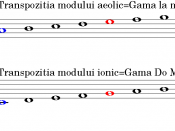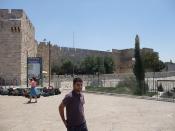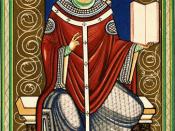Professor Lynn Mitchell
The Bible and Western Culture
3 December 2013
Western Music and the Bible
The history of western music in Europe is linked with the history of the Christian church, the prevailing social institution for most of the Middle Ages. Religious services were commonly sung or chanted as opposed to lecturing. The Bible influenced many aspects of western music, from the development of notation in the mid 9th century to the compositions of secular opera and orchestral works. The development and advancement of western music can be attributed to culturally rich musical traditions in Israel, Political impacts on sacred liturgy and musical interpretation, and secular operatic and orchestral works from later centuries.
The pre-monarchic period marked the beginning of Israel's musical traditions. Lyrical material of biblical times is the most noteworthy survival of music to date. The ancestors of Israel are illustrated in the Bible as semi-nomads who would travel long distances in search of grazing land and water for their herds of animals.
This is seen in the Song of the Well (Num. 21.17-18), which bares their constant search for resources and incessant quarrels over land as shown in many of their war songs. 17Then Israel sang this song: "Spring up, O well! - Sing to it! - 18The well that the leaders sank, that the nobles of the people dug, with the scepter, with the staff." In the case of Miriam's brief song of triumph the biblical author reports that the women in her entourage danced and beat their tambourines. This suggests a sharp, strident, staccato rendering of brief war refrains. In the case of longer war odes it seems likely that they had a more elaborate instrumental setting, and, as Genesis 4.21 suggests, such instruments as harps and pipes were used from an...


